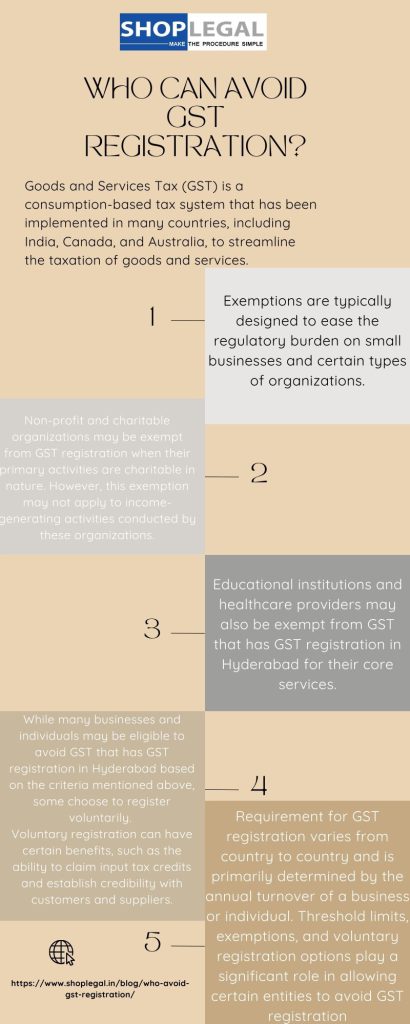Who can avoid GST registration?
TALK TO EXPERTS
Goods and Services Tax (GST) is a consumption-based tax system that has been implemented in many countries, including India, Canada, and Australia, to streamline the taxation of goods and services. In this system, businesses are required to have GST registration in Hyderabad if their turnover exceeds a certain threshold. However, there are certain exemptions and thresholds that allow certain entities to avoid GST registration. In this blog, we will explore the criteria and circumstances under which businesses and individuals can avoid GST registration.
GST Registration Threshold:
The first and foremost consideration in determining whether a business or individual needs to register for GST is the threshold turnover limit set by the tax authorities. This threshold varies from country to country, and it may also differ based on the type of goods or services provided by the business.
In India, for instance, the GST threshold limit for businesses is currently set at ₹40 lakhs (₹20 lakhs for special category states). This means that businesses with an annual turnover of less than ₹40 lakhs (₹20 lakhs in special category states) are not required to register for GST and can avoid the associated compliance burden.
Similarly, in Canada, the GST/HST threshold is set at Rs.30,000 in annual revenue. Businesses with annual revenues below this threshold are not obligated to register for GST/HST.
Exempted Categories:
In addition to the threshold limit, certain categories of businesses and transactions may be exempt from GST that has GST registration in Hyderabad altogether. These exemptions are typically designed to ease the regulatory burden on small businesses and certain types of organizations. Here are some examples of exempted categories:
Small Businesses:
Many countries provide special provisions for small businesses to avoid GST registration or reduce their compliance requirements. These provisions often include higher threshold limits or simplified tax reporting procedures.
Agricultural Activities:
In some jurisdictions, agricultural activities, such as farming and the sale of agricultural produce, may be exempt from GST registration or subject to special rules.
Charitable Organizations:
Non-profit and charitable organizations may be exempt from GST registration when their primary activities are charitable in nature. However, this exemption may not apply to income-generating activities conducted by these organizations.
Educational and Healthcare Services:
Educational institutions and healthcare providers may also be exempt from GST that has GST registration in Hyderabad for their core services. However, they may still be necessaryto register for GST if they engage in taxable activities unrelated to their primary mission.
Exporters:
Businesses engaged in the export of goods and services are often exempt from GST, as the tax is designed to be a consumption-based tax. Exporters may be eligible for GST refunds on inputs used in the production of export goods and services.
Certain Goods and Services:
Some countries exempt specific categories of goods and services from GST. For example, in India, essential food items like vegetables, fruits, and grains are exempt from GST.
Voluntary Registration:
While many businesses and individuals may be eligible to avoid GST that has GST registration in Hyderabad based on the criteria mentioned above, some choose to register voluntarily.
Voluntary registration can have certain benefits, such as the ability to claim input tax credits and establish credibility with customers and suppliers. It can also be advantageous for businesses that primarily deal with other registered entities, as it simplifies the input tax credit process.
However, businesses that voluntarily register for GST must comply with all GST regulations, including filing regular returns and maintaining proper records. They may also be subject to audits and assessments by tax authorities.
Impact of Avoiding GST Registration:

Avoiding GST which has GST registration in Hyderabad can have both advantages and disadvantages, depending on the specific circumstances of the business or individual. Here are some key points to consider:
Advantages:
Reduced Compliance Burden: Businesses with turnover below the threshold limit can avoid the administrative burden of GST registration, including filing returns and maintaining records.
Cost Savings:
Avoiding GST registration means no GST collection or payment, which can result in cost savings for small businesses.
Simplicity:
Exempted categories often enjoy simpler tax treatment, making it easier to focus on their core activities.
Disadvantages:
Limited Input Tax Credits: Businesses that are not registered for GST cannot claim input tax credits, which can increase their overall tax burden.
Competitive Disadvantage:
Not being registered for GST may put businesses at a competitive disadvantage compared to registered competitors.
Missed Opportunities:
Avoiding GST registration may mean missing out on certain tax benefits, such as GST refunds for exporters or input tax credits.
Some uses of GST registration in Hyderabad
Simplified Tax Structure:
One of the primary advantages of GST is its ability to simplify the tax structure. Under the previous system, businesses had to deal with multiple taxes like excise duty, service tax, and VAT, leading to complexity and confusion. GST replaces these with a single, unified tax, making compliance easier for businesses.
Removal of Cascading Effect:
GST that has GST registration in Hyderabad eliminates the cascading effect of taxes, also known as tax on tax. This occurs when taxes are levied on top of taxes at multiple stages of production and distribution. With GST, businesses can claim credit for the taxes paid on inputs, leading to a more efficient and fair tax system.
Wider Tax Base:
GST widens the tax base by including a broader range of goods and services, including previously untaxed sectors of the economy. This expanded tax base can help governments generate more revenue, reducing their dependence on a few sources of income.
Conclusion:
In conclusion, the requirement for GST registration varies from country to country and is primarily determined by the annual turnover of a business or individual. Threshold limits, exemptions, and voluntary registration options play a significant role in allowing certain entities to avoid GST registration.
It’s crucial for businesses and individuals to understand the specific GST regulations in their jurisdiction and carefully assess whether it is in their best interest to register for GST or take advantage of the exemptions provided.
While avoiding GST which has GST registration in Hyderabad may reduce administrative burden and costs, it may also limit access to certain tax benefits and potentially put businesses at a competitive disadvantage. Therefore, a thoughtful evaluation of the pros and cons is essential to make an informed decision regarding GST registration.







